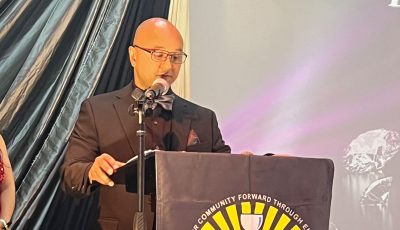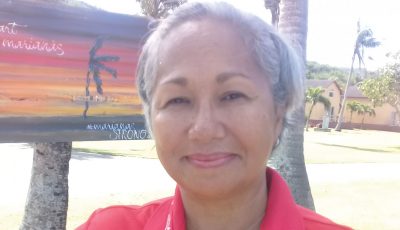‘NMI economy will crash without intervention’
Without a fix, mass exodus of 9,000 workers seen before Sept. 30
Both the Saipan Chamber of Commerce and the Northern Marianas Business Association Corp. are appealing to Delegate Gregorio Kilili C. Sablan (Ind-MP) to intervene in the processing of work permits for foreign workers in order to avert an economic disaster for the CNMI.
In a four-page letter to Sablan dated Monday, the Chamber sought his aid for an immediate, short-term solution to avoid a mass exit of foreign workers in the CNMI, categorized as CW-1 workers. The organization also included recommendations they believe will further assist with future CW applications.
Come fiscal year 2020 starting Oct. 1, 2019, CW-1 workers who have yet to receive their renewed CW petition and are not eligible for the 240-day automatic extension while pending a decision from the U.S. Citizenship and Immigration Services on their petition will have to exit the CNMI, which the Chamber believes would severely disrupt the economy.
“We [Chamber] ask for your [Sablan] assistance in remedying…and finding a short-term solution to avoid the exodus of half of our workforce before [Sept. 30, 2019],” Chamber president Velma Palacios wrote Sablan.
She noted that several policies embedded in last year’s H.R. 5956, also known as U.S. Public Law 115-218, “unintentionally impedes” moving toward a non-CW worker reliant workforce within a 10-year period as provided by the legislation.
The Chamber previously told Saipan Tribune that several businesses under the organization are struggling with U.S. Department of Labor requirements to process their CW petitions. Only 33 days remain before existing CW-1 permits expire on Sept. 30, 2019, yet it takes USDOL around 41 days on average to process Temporary Labor Certifications, according to Sablan last Monday.
Yet the TLC is only Step 2 of the four-step process required by USDOL for businesses to apply for CW visas. Additional steps beyond the TLC include a job vacancy announcement posting, which takes about 21 days.
Businesses can only start applying CW petitions 180 days—or six months—before its intended date of hiring or renewal. The estimated 41 days for TLC processing, combined with the 21 days for JVA posting, accounts for a third of the total days allotted for CW processing already—and only for the USDOL side of the CW visa renewal and application requirements. U.S. Citizenship and Immigration Services has its own set of timelines and usually takes about three months to fully process.
“We will experience upwards a 95% reduction of workers within the first two years of the passage of U.S. P.L. 115-218 because of [several] policies,” Palacios wrote Sablan.
“The…policies are causing delays in visa processing, [creating] unattainable logistical barriers, and [disallowing us] to transition to a U.S. workforce in a way that will not crash our economy or allow us to recover from [Super] Typhoon Yutu,” she added.
In a separate statement, Northern Marianas Business Administration Corp. president Alex Sablan told Saipan Tribune, “We hope Gov. [Ralph DLG] Torres and [Delegate] Kilili Sablan are successful in intervening and providing the reprieve needed to keep our economy growing while balancing the required hiring of U.S. citizens.”
“At this time, if no remedy comes into place to either increase USDOL’s capacity to process TLC’s or to provide protection to CW renewal applicants and allow them to reside in the Commonwealth while their visas are being processed, the result is a mass exodus of approximately 9,000 workers before Sept. 30, 2019 that our economy cannot handle,” Palacios said.
Exclude ‘touchback’ provision
U.S. P.L. 115-218’s “touchback” provision, which requires all CW workers to exit the CNMI to “touch back” at their country of origin before they could renew their visa, would result in the CNMI losing about half of its workforce for a period of 70 to 140 days, Palacios said in her letter to Sablan.
At present, 95% of all CNMI-only CWs expire on Sept. 30 of every year.
“As we interpret the law, we can only begin processing renewal visas after 30 days [from the CW worker’s exit]. This means on Oct. 1, 2020, we will lose approximately half of our workforce for a period of 70 to 140 days, shutting down business operations and drastically impacting our economy’s ability to function,” Palacios said.
She reiterated that the CW visa is not “and never will be a pathway to citizenship.”
“The negative impact of shutting down a volatile economy for 30 days far outweighs the benefit of the touchback provision for a visa that will not lead to U.S. citizenship. We ask for the exclusion of the 30-day touchback provision,” the letter noted.
Periodic PWS requirement, not annual
Another factor that impedes the CNMI economy’s eventual independence from CW workers include the annual prevailing wage survey requirement, wrote Palacios.
“Because of restrictions set forth by the U.S. Department of Labor in requiring three businesses with at least 30 staff to determine a CNMI wage, wage determinations for 532 out of 823 total occupations were reflective of wages in Guam or the U.S. rather than those based on our economy,” Palacios said.
With this data, she noted, the CNMI PWS reportedly doubles or even triples the wages for occupations that do not meet the three businesses and 30 staff rule, forcing the CNMI to have wages that “do not fit our current economy.”
“Industries most dramatically impacted by Guam and U.S. wage determinations are those in niche, specialized professions such as those in health care and construction sectors,” Palacios noted, adding that this unintentionally impacts access to professionals and laborers for Super Typhoon Yutu recovery.
“We support the implementation of the PWS. However, because of the drastic implications of having to take on other economies’ wages for niche occupations, we ask for periodic reviews similar to other jurisdictions rather than mandated annual reviews,” Palacios wrote, adding that periodic review will allow more “organic wage growth” that can support the economy.
Local jurisdiction for TLC and PWS
The Chamber asked that the CNMI Department of Labor be given jurisdiction over the issuance of temporary labor certifications and the PWS to help lessen the time needed for processing.
“…Because of the increased responsibilities of the USDOL and the USCIS, we are experiencing delays in visa processing past the original 30 to 45 days originally told to us [by the U.S. House Natural Resources staff delegation],” Palacios wrote.
“At this time, we fear a mass exodus of approximately 9,000 people on Sept. 30, 2019, because of the delays in processing,” Palacios added.
“To alleviate pressure on USDOL and USCIS for timelier responses to CW applications, we ask for more local jurisdiction in processing TLC’s and prevailing wage determinations,” Palacios added, emphasizing that a partnership between local and federal agencies would allow for quicker processing to stay true to the 30 to 45 days promised processing time.
Larger return window
Current law requires an applicant who receives their CW visa to enter the CNMI within 10 days of receiving the visa.
The Chamber is asking for increased time to allow the CW holder to enter the CNMI once their ultimate visa is received after citing delays in source country processing. The Chamber recommends to allow for a 30-day window instead of just 10 days to enter the CNMI.
“…Within that 10-day timeframe, they must also go through the immigration process of their source country requirements. These requirements can take anywhere between 10 to 21 days, depending on the source country, not allowing the CW enough time to [enter] the Commonwealth once their source country has processed their documentation,” Palacios wrote.
Five years to allow CW construction workers
Citing the opportunity to independently recover from Super Typhoon Yutu instead of relying on the federal government, the Chamber asks for Congress to allows a five-year exception for workers in the construction industry to apply for a CW visa.
Current law prohibits construction workers from entering the CNMI on a CW visa.
“…The demand for construction workers has exponentially exploded due to the impacts of [Super] Typhoon Yutu. The current structure has made it so the cost to do construction has tripled, making it so average families cannot rebuild from the typhoon,” Palacios wrote.
“Right now, because construction workers can only be brought in on project-based visas, only very large companies can avail of construction workers, leaving small businesses and families struggling to recover,” she noted.



























